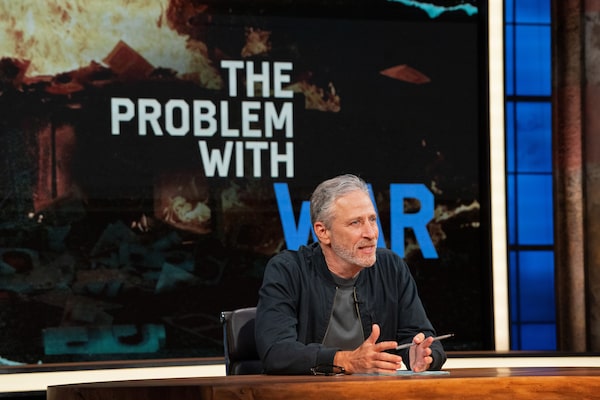
The new current affairs series from host, writer, producer, director and advocate Jon Stewart dives into some of the most enduring issues of our time.Cara Howe/APPLE TV+
One recent Sunday evening, I decided to watch the final episodes of Sky Rojo on Netflix. I lasted about 10 minutes. Much as I admire the vivid energy of its frightening take on macho anger, what I saw included a rape scene and a woman losing an eye in a grim battle with her tormentor.
Next, I watched the opening of that night’s The Walking Dead. It opened with a character being obliged to watch a man being tortured. The man’s fingernails were being pulled out. Eventually, I settled on an episode of House Hunters International and saw a middle-aged American couple find an apartment in Brussels. Although they aimed to live in the city centre, they settled for a bland space in the suburbs.
It was grimly amusing, which is about as funny and light as it gets on TV these days. The times we live in are antithetical to hilarity. Is there a reliable sitcom anywhere, these days? One that doesn’t have baggage? Into this arena comes Jon Stewart with his new show, The Problem with Jon Stewart (streams AppleTV+, new episodes every second Thursday). Is it funny? In two words, not really.
The 21 best TV series to stream so far in 2021
The return of Stewart, six years after he left The Daily Show, was highly anticipated. He had changed late-night TV, he’d turned the news into a comedy carnival. This new show was going to be fun times again. Wrong. It’s serious and, on the evidence of the first two episodes, all-over-the-place unfunny with a few joyless jokes sprinkled into it.
The first episode, War, is a serious, angry exposé of the situation of U.S. Army veterans who came into contact with toxins while on duty overseas. It seems the U.S. Army, wherever it goes, gets rid of its trash – everything from damaged equipment to human feces – by burning it. These “burn pits” sent fumes throughout bases and the serving soldiers were expected to just deal with it. A former officer says bluntly that in Iraq the figures show more veterans were made ill by exposure to toxins than by bombs and bullets. Stewart interviews U.S. Veterans Affairs Secretary Denis McDonough, who says there’s a problem but also that the department needs more proof.
The gist is that Stewart frames the issue around “performative patriotism,” and he mocks everyone from politicians to pop stars for their declarations of unswerving support for the troops. Then he talks to victims. The only jokes you’ll hear come from footage of Stewart talking to the show’s staff, where wisecracks about unfunny subjects are thrown around.

The return of Stewart, six years after he left The Daily Show, was highly anticipated.APPLE TV+
The second episode, Freedom (streams from Oct. 21), is far closer to The Daily Show in style. There’s Stewart at the desk, all smiles and mischief. He shows footage of various politicians talking about American freedom. He makes fun of Ted Cruz. Then he settles down to a scathing look at some Americans who decline to be vaccinated or wear a mask, in the belief that they have the freedom to do that. Stewart pokes at Republicans by showing footage of Ronald Reagan saying, “freedom isn’t free.”
He does his inimitable look of incredulity and aims that incredulous stare at the camera. Just like the old days. “Freedom isn’t free, but wearing a mask is too high a price?” he asks. There follows a lecture on collective responsibility and individual liberty, with a few jokes thrown in. Plus an earnest look at what real authoritarianism means and how that’s different from vaccinations and mask-mandates.
It’s witheringly funny, with the emphasis on withering. What jokes and gags there are seem more like embellishments than the engine of the show. Stewart is still what he is – articulate, charismatic and able to command the audience with ease. But like most of the late-night hosts these days, he is less engaged with the therapeutic needs of the audience for laughter than he is asking the viewer to just be aware of strange polarizations and contradictions. Watch late night these days and what you’re being told is that we live in a polarized, reactionary, racist, misogynistic and homophobic world. Deal with it, we’re advised. Maybe try self-care rather than relying on comedians to pull us through.
Nope, there isn’t cathartic laughter flowing and instead we get what feels like a reminder that crying is cathartic, too. For now, gleeful fun is on hiatus, and not even Jon Stewart can bring it back with his stares of mock amazement.
Plan your screen time with the weekly What to Watch newsletter. Sign up today.